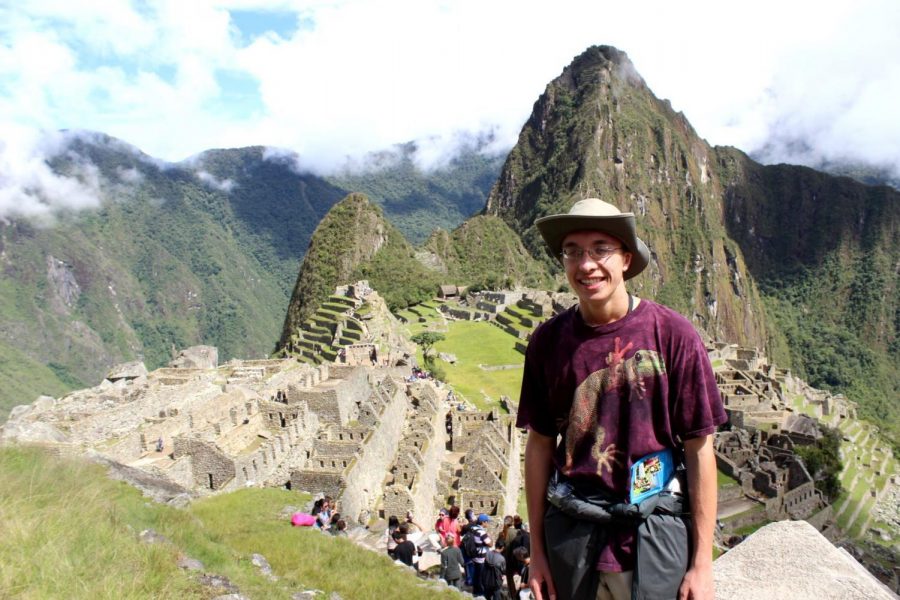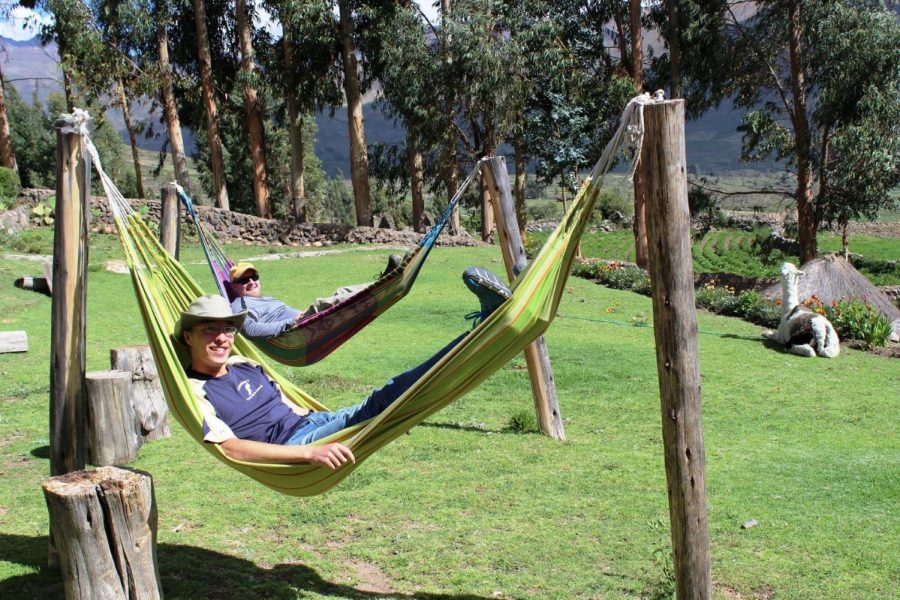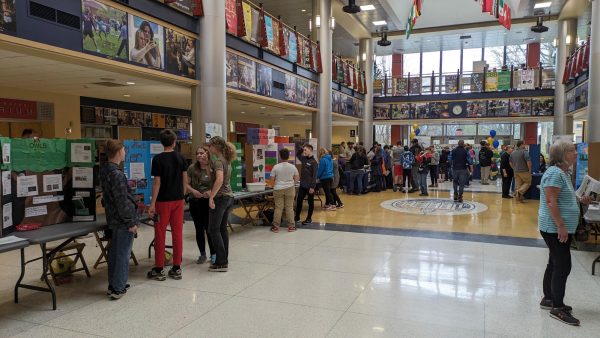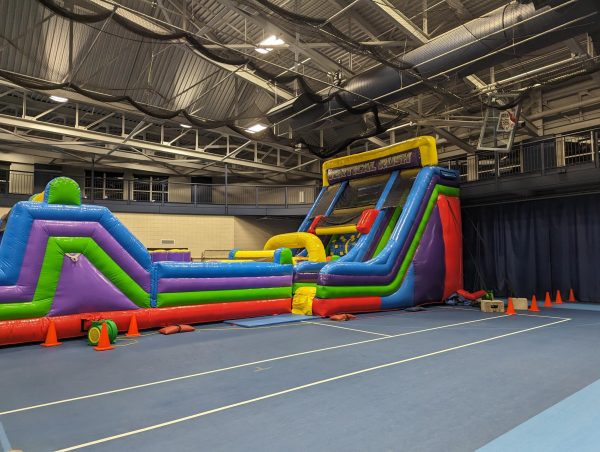Remembering David
Campus reflects on life, work of Allegheny student
It was the season of Lent some 20 years ago, and children in Freeport, Pennsylvania, vowed to surrender video games and chocolate.
“Well Dave gave up the alphabet for Lent,” Nancy Shipe said. “And by George, that boy would not practice his letters or reading or anything.”
David Shipe, ’18, the son of Nancy, a physical therapist, and Peter Shipe, a mechanical engineer, grew up in Armstrong County, Pennsylvania, and began entering science fairs as a child, a reflection of his budding curiosity for the world’s wonders.
David grew to be especially passionate about environmental issues and conservation, Peter recalled, and when David looked into colleges and universities to attend after high school, he looked to Albright College in Reading, Pennsylvania, to Bucknell University in Lewisburg, Pennsylvania, and to Allegheny.
Members of the Allegheny College community closest to David knew him as a kind friend, an avid quidditch player, an active sustainability advocate and a man with a remarkable wit. David died on Nov. 9, 2018, at Allegheny Valley Hospital in Natrona Heights, Pennsylvania, after receiving a terminal brain cancer prognosis in May, a few weeks after his May 12 graduation.
“In his own words, Allegheny was the best experience of his life,” Nancy said. “So graduation was the culmination of that — celebrating success, celebrating relationships, celebrating friendships.”
David’s involvement in Allegheny projects included advocating for local food production efforts, working in Allegheny’s Carrden, organizing with the Edible Allegheny Campus club and leading operations for the college’s aquaponics system in Carr Hall.
This dedication to college sustainability led David to become a Campus Sustainability Champion in 2016, an honor he shared with Allegheny College Sustainability Coordinator Kelly Boulton, ’02, for her work reducing college waste and energy consumption.
Being named Campus Sustainability Champion is an annual award presented by the Pennsylvania Environmental Resource Consortium, a statewide collaborative committed to connecting students and faculty from different colleges to facilitate sustainability projects and research.
“I’m honored to have been recognized from among such a rich community of sustainability activism here at Allegheny,” David told the college in 2016.
Though Boulton did not know David well, she said she knew him by his reputation as a driven student.
“One of the things I love about Allegheny is that students are challenging faculty and staff to be their best just as much as faculty and staff are challenging students,” Boulton said. “David was one of those students that was always stepping up and doing really good, solid work and it made all of us want to step up and do really good, solid work.”
He was always looking out for somebody else, all the time. He was the embodiment of all the reasons you want to be a good person.
— Jennifer Torrance, Class of 2016, Allegheny College
A biology and environmental science double major, David had planned to graduate one semester early — in December 2017 — after receiving an initial cancer diagnosis his sophomore year at Allegheny in the fall of 2015. The first round of surgery and radiation treatments, “kicked his butt,” Peter said, and David ended up graduating on time in May 2018.
“With a double major, cum laude,” Nancy added.
Nancy and Peter first realized David was sick when he had a seizure one night during his sophomore semester.
“He woke up underneath his bed and recognized that this wasn’t normal, so he was smart enough to tell us,” Nancy said. “How many kids would say, ‘Wow, that’s weird,’ and forget about it?”
Within a week of the seizure, David was told he had a slow-growing, benign, pediatric brain tumor, about the size of a quarter. After undergoing surgery to remove the mass, a small part of the tumor remained and existed as a “tweener,” until sometime in the spring of 2018 — not exactly benign, but not exactly malignant either.
He took some time off from his on-site classes at the college, but “graduated on time through all his adversity,” Nancy said.
David and his family planned to travel to Scotland and Ireland after his Allegheny graduation, and they made a two-week trip together. Upon returning home, within three days, David experienced some weakness in his left side, and during a stay at Children’s Hospital of Philadelphia, David was told he would likely have between days and two weeks to live after another surgery attempted to address the then-aggressive cancer. The tumor had grown to the size of a softball.
“David was a guy, always in his life, that if you told him he couldn’t do something, he had to prove you otherwise,” Nancy said. “Now that’s his ornery streak, and in this instance I think it helped him … he lived another five months, and he made the absolute most of those five months in spite of his physical limitations.”
During those five months, David was approached by two of his uncles, first by Tom Kulikowski then by Eric Kulikowski, about establishing an Allegheny scholarship in his honor.
“It took (David) a couple days to come around to the idea that it wasn’t done as pity but as honoring what he had accomplished,” Peter said.
The plan, Nancy said, is for the David R. Shipe Scholarship Fund to be endowed and for David’s family to grow the scholarship for future students. Tom and Eric have agreed to match any donations, she said.
“The goal of David and our family is to raise $100,000, so that it’s hopefully a meaningful assistance to budding scientists and environmental scientists,” Nancy said.
The inaugural David R. Shipe Scholarship was awarded to Bobby Bower, ’20, at a ceremony in October, at which David was present, along with his family. Environmental science and sustainability faculty and students gathered in Carr Hall to celebrate Bower’s award as well as dedicate the aquaponics system in David’s honor.
“David was so happy that day,” Nancy said. “At that point he was really struggling to walk even, but he walked into that place, he walked all around and he stood.”
As a student manager for the aquaponics system — a controlled system that combines growing plants in water and raising fish, David was trained by his best friend, Jennifer Torrance, ’16, who started working in the aquaponics lab as a first-year.
“Those were some of my fondest memories at Allegheny,” Torrance said. “Just hanging out in the aquaponics lab in the afternoons when it was cold outside, but it was warm in there.”
Torrance was responsible for training David, but because he learned so quickly, she said he became her co-leader and began teaching alongside Torrance, training students, including Bower during Bower’s sophomore year.
While Torrance and David worked together, the aquaponics system grew basil.
“Dave hated basil, but he would always stay and help me pick it anyway, and then he would jokingly complain that basil had no right to be in food,” Torrance said with a laugh.
The system is located in Carr Hall and features a fish tank base, currently populated with native bluegill, and produce sprouting at the surface of the tank.
Grow lights allow the plants of the indoor system to photosynthesize and filter out fish excrements from the water below, which are broken down and used as nutrients for the growing plants with the filtered water set up to re-enter the system.
David and Torrance, learned about aquaponics systems from TJ Eatmon, former assistant professor of environmental science at Allegheny. The aquaponics system began as a research project for Eatmon, according to Casey Bradshaw Wilson, assistant professor of environmental science and sustainability.
The system has since generated tilapia, lettuce, dill and basil, products that have been sold to Parkhurst Dining Services for use in Allegheny College dining halls.
During the transition from research project, through different iterations and to the current system, Bradshaw Wilson said, David was instrumental in the process, offering suggestions and attending meetings with Parkhurst representatives.
Bradshaw Wilson said David was also instrumental in training other students to maintain the aquaponics system, including Bower, after Eatmon left the college around 2015.
Through Bower’s training and new work, Bower said he began to regard David as a friend — a friend who taught him the mechanics of the aquaponics system and a friend with a profound work ethic. Bower recalled David as someone “who truly was passionate about the environment.”
Bower said he was “shocked and honored” to have received David’s scholarship and be notified by Melissa Mencotti, director of gift planning for the college. Neither David’s family, nor college faculty were involved in the selection process, Nancy said.
“It was fortuitous that it happened to be Bobby,” she said.
Like David, Bower is an environmental science and biology double major, who first thinks of David’s work ethic when he remembers his friend and teacher.
Allegheny professors shared in Bower’s appreciation for David’s work ethic, as well as for his classroom contributions.
“He had such a deep understanding of conservation for wildlife before he even came to my class, so I gave him a lot of new tools, but he had a lot to work with too,” said Bradshaw Wilson, who taught David in a conservation biology course. “Any book I suggested, he borrowed it and read it, and gave it back in a couple weeks. He really ate all of that information up.”
Professor of Environmental Science and Sustainability Rich Bowden was David’s adviser since David’s first semester at Allegheny. At the time, Bowden’s first-year seminar was a conservation natural resources course that was often taught outside. Bowden also taught David in another class, forest ecology, where students spent much of their time outside.
“(David) was intrepid,” Bowden said. “The course was in (the) winter semester, which means we’re outside in the winter and the snow and the cold … Dave was the first to jump on board and get involved in things, in field work, in lab work. He just thrived in that kind of a setting. He loved being outdoors. In the class … he was an excellent contributor. He asked really thoughtful and insightful questions.”
Describing himself not only as David’s teacher, but his friend, Professor and Chair of Environmental Science and Sustainability Eric Pallant echoed Bowden’s thoughts on David’s passions.
“(David was) wicked smart, had a wicked sense of humor,” Pallant said.
Prior to David’s brain surgery in the summer of 2018, he had been hired to work aboard an “old-time sailing vessel,” according to Pallant.
Working aboard the A.J. Meerwald, a restored oyster schooner sailing near New Jersey and Delaware, David would have served as a science educator following graduation. “Due to their kindness,” Nancy said, the crew allowed David and his family to sail the Meerwald, though he was unable to take the science educator position.
“Within days of having brain surgery, I don’t know how he did it … he spent a day sailing and singing sea shanties and pulling ropes,” Pallant said. “Anybody with any kind of surgery shouldn’t be (doing that) three or four days later, but he was out there. He had a great day.”
Torrance also spent the day sailing with David and his family, and she expressed gratitude for David’s willingness to share in her adventures.
“I’m a very adventurous person, I always want to try something new, but I always want somebody to go with me,” Torrance said. “Dave was always the person that said ‘yes.’”
David’s active spirit was apparent in his involvement in Allegheny’s Dumbledore’s Army, which is a chapter of the global nonprofit, The Harry Potter Alliance.
Sarah Veney, ’19, president of Dumbledore’s Army, described her favorite memory of David: David’s first year at Allegheny, he noticed students gathered in the Gator Quad and joined their game, not knowing he was playing quidditch.
“He’d never read or seen Harry Potter prior to this, and he loved quidditch so much that he went and read all seven Harry Potter books in the span of a month,” Veney said.
Dumbledore’s Army plans to host a quidditch-related event this semester in David’s memory.
Beyond Allegheny, David was dedicated to daily environmental sustainability and had been interested in living in a tiny house, Nancy said.
Although tiny houses have existed since Henry David Thoreau’s novel “Walden” was published in 1854, the trend became popular in the United States during the mid-2000s, according to a timeline written by journalist Emily Nonko. The average size of a tiny house is between 100 and 400 square feet, as opposed to the 2,600 square feet of a standard American home, according to “The Tiny Life,” a tiny house website.
When David received news that his cancer was terminal, a doctor asked what would make him want to live, Nancy said.
“David said, ‘Well, everyone needs their own place, and I’ve always dreamed about living in a tiny house,” Nancy said. “So I looked at my husband and said, ‘Well, I guess you’re building a tiny house.’”
It was his place. It built a sense of community, it helped the rest of us feel like we were able to do something, and I truly believe that contributed to him living — not just surviving, but living — for five months after his prognosis was so poor.
— Nancy Shipe
During the summer of 2018, once David had returned home from Children’s Hospital of Philadelphia, a friend who worked as a residential carpenter collaborated with Peter and David to begin designing his tiny house. Less than a week after the designing began, about 50 community and family members arrived at the Shipe house to begin constructing David’s new home in their backyard, according to Nancy.
“Through the next seven weeks it took to build, we had people here every day,” Nancy said. “(Peter’s) family was relentless in their support and sharing their abilities to design and build this house. There were no plans … (the house) just evolved.”
The support the Shipe family received came not only from relatives, but from high school friends and community members who heard about the construction.
“We had people show up who we didn’t know,” Peter said. “They were friends of a friend who heard this was going on. Kids (David) had gone to high school with showed up. We had people at our church bring food by. Everybody showed up. It seemed like any time we needed something, there was somebody there who showed up to take care of things.”
As the tiny house was being built, Nancy said her mission was to make sure everyone was well-fed — meals became David’s favorite part of the summer.
“We had people for dinner at our dinner table,” Nancy said. “The fewest was probably eight, but we had 14 to 20 people, and that was Dave’s time to hold court. That was time for him to tell snarky jokes and to just have some banter with the folks that were here.”
The tiny house was built on an 18-foot trailer and is about 7 feet wide with a back porch, Peter said. To celebrate the place so many people helped David design and build, the community gathered for a ribbon cutting ceremony and a tiny open house for “Dave’s Place.”
“I was going to paint a pair of hedge shears gold, for big scissors,” Peter said. “But that wasn’t appropriate (for a tiny house), so (David) used a pair of scissors from a Swiss Army knife to cut the ribbon.”
The color scheme of David’s tiny house was selected by David himself, who chose a kelly green stain for the interior wood, Peter said.
“Everybody looked at the stain samples and said, ‘We’re going to put that inside?’” Peter said. “The walls were green, it had a white ceiling in it and a laminate wood floor, a walnut colored floor, so it looks pretty homey.”
David was able to stay in his little house for several months, and it now serves as a place for his siblings and guests to stay when they visit, Nancy said.
“It was his place,” Nancy said. “It built a sense of community, it helped the rest of us feel like we were able to do something, and I truly believe that contributed to him living — not just surviving, but living — for five months after his prognosis was so poor.”
While David was at Children’s Hospital of Philadelphia in June, David told his mom he wanted to have a contra dance as part of his funeral.
Contra, a community-oriented folk dance, has been offered as an Allegheny course as well as a community event in Meadville, typically hosted by Rachel O’Brien, contra step caller and Allegheny professor of geology, and TOPPISH, a local Irish and Scottish folk band.
The Shipe family organized a contra dance for David over the summer and planned a second dance for Nov. 18, 2018.
“As it turns out, David died on Nov. 9, and we knew we would have to have his funeral on a Saturday because of the number of people who were coming from out of town, so that put his funeral on Nov. 17,” Nancy said. “And that contra dance had been scheduled two months earlier for the very next day.”
David took a contra dance course his first year at Allegheny and was required to write a contra dance as part of an assignment, Peter said. David’s dance was performed to the music of TOPPISH as the final steps of the Nov. 18 dance.
Nancy recalled, “We had the contra dance, and it wasn’t until then that I actually thought what a compassionate man he was, to give us permission, while we’re grieving, to dance and to laugh.”
When they think of David, Nancy and Peter said, they think of his smile. A smile they saw as he sailed the A.J. Meerwald, as he became a teacher and friend to Alleghenians, as his community gathered to build one tiny house and as he rocked in his rocking chair, wearing his favorite hat, on the porch of Dave’s Place.
“He was always looking out for somebody else, all the time,” Torrance said. “He was the embodiment of all the reasons you want to be a good person.”
Ellis Giacomelli is a senior majoring in environmental science and minoring in journalism in the public interest. She serves The Campus as a features editor...
Lauren Trimber is a senior majoring in English and creative writing and minoring in political science. This is her third year on staff, and she will be...









Yvonne from Brooks • Jan 31, 2019 at 4:34 pm
What a beautiful article and tribute to a wonderful person taken too soon. I got to see and talk with David very often over his 4 years at Allegheny. He was always a gentleman happy and very memorable. He was a gift to this world .I will forever remember seeing him walk down the Brooks walk with his favorite hat on.
Barbara Jean Billek-Sawhney • Jan 31, 2019 at 3:30 pm
Thank you Ellis and Lauren, What a gift you gave to Nancy, Peter, and the entire Shipe Family. The day this was published would have been his 23rd birthday! Did you plan that? If so – great job! If not – great job still! Blessings to you and Allegheny for making David’s college years memorable! With sincere gratitude, Aunt Barb
Sue Gerhard • Jan 31, 2019 at 1:18 pm
What a wonderful young man and excellent thoughtful tribute by a college community.